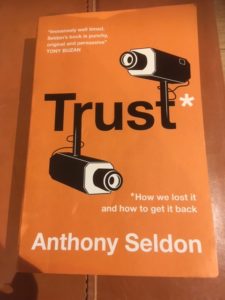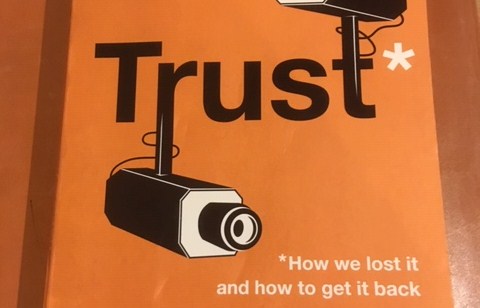24 January 2019
Lack of Trust
Endemic and getting worse?
By Lynda Goetz
 I have just finished re-reading Anthony Seldon’s book ‘Trust’; first written and published in 2009, this book addresses in a constructive manner the issue of lack of trust in modern Western society, with particular reference to Britain. It still makes for particularly relevant and interesting reading now, almost ten years later. Far from being a problem we have tackled and overcome, the lack of trust in modern, so-called developed societies seems to be worse than ever.
I have just finished re-reading Anthony Seldon’s book ‘Trust’; first written and published in 2009, this book addresses in a constructive manner the issue of lack of trust in modern Western society, with particular reference to Britain. It still makes for particularly relevant and interesting reading now, almost ten years later. Far from being a problem we have tackled and overcome, the lack of trust in modern, so-called developed societies seems to be worse than ever.
As Dr Seldon (now Sir) points out in his opening chapter, 2009 was a bad year for trust in Britain. Just a year after the Global Financial Crisis of 2007-8, there were a number of events which occurred in this country which further eroded the public’s trust in government, the police, social services and the media, as illustrated by the MPs’ expenses scandal; the excessive force used by the police at the G20 summit in London; the Baby Peter case so badly mismanaged by Haringey social services and the News of The World phone hacking scandal (which also tainted Cameron’s government by connection) all contributed to an atmosphere where trust was in short supply.
At the beginning of 2019 we seem to be in an almost unimaginably worse position, particularly as regards our politicians. It is hard not to feel an element of despair as one contemplates the total chaos that is Brexit. Two and a half years ago, the country voted by 52% to 48% to leave the EU. 70% of MPs are Remainers and it now appears that many of them are prepared to stoop to almost any level to ensure that this vote is not honoured. We are currently faced with the unedifying spectacle of MPs from all parties conspiring together to put a spanner in the works and ensure either that Brexit is delayed indefinitely or that quite simply it never happens. This, as Liam Fox, amongst others, has pointed out is a clear ‘breach of trust’. The MPs, it seems, don’t see it that way. They appear to consider that it is their right to impose their view on the people rather than to represent their voters and do all in their power to enact the will of those who have elected them.
 Nobody is under any illusions about the complexities of the issues involved, but, as we all know, had the vote gone the other way, there would have been no more talk of further referendums. To do so at this juncture on the grounds that it is now evident how difficult the issues are is an insult to all of us. As has been pointed out, it is almost as if we are supposed to keep on having referendums until we come up with the ‘right’ result (rather as the Irish were forced to do when they voted by 53.4% against the Lisbon Treaty in in 2008 but then approved it a year later in a second referendum). Even considered, constructive suggestions such as the one proposed by Sir Anthony himself in a letter to The Telegraph on Monday (reproduced in part below*) set aside the fact that we have already had a vote which has been won by a clear, if small majority. We should now leave. Anything else is a betrayal of democracy and of trust. If that means leaving on 29th March on WTO terms, then so be it. As a businessman said to me recently, ‘Businesses have to change and adapt the whole time. Any sensible business has already made preparations for leaving without a deal’. The decision to leave may or may not be a good one, and only time will tell, but for us to continue to have trust in our parliamentarians and those who govern us we need to be able to rely on them to represent us, not patronisingly to thwart us. Manoeuvrings of the sort which are now being engaged in serve only to erode trust.
Nobody is under any illusions about the complexities of the issues involved, but, as we all know, had the vote gone the other way, there would have been no more talk of further referendums. To do so at this juncture on the grounds that it is now evident how difficult the issues are is an insult to all of us. As has been pointed out, it is almost as if we are supposed to keep on having referendums until we come up with the ‘right’ result (rather as the Irish were forced to do when they voted by 53.4% against the Lisbon Treaty in in 2008 but then approved it a year later in a second referendum). Even considered, constructive suggestions such as the one proposed by Sir Anthony himself in a letter to The Telegraph on Monday (reproduced in part below*) set aside the fact that we have already had a vote which has been won by a clear, if small majority. We should now leave. Anything else is a betrayal of democracy and of trust. If that means leaving on 29th March on WTO terms, then so be it. As a businessman said to me recently, ‘Businesses have to change and adapt the whole time. Any sensible business has already made preparations for leaving without a deal’. The decision to leave may or may not be a good one, and only time will tell, but for us to continue to have trust in our parliamentarians and those who govern us we need to be able to rely on them to represent us, not patronisingly to thwart us. Manoeuvrings of the sort which are now being engaged in serve only to erode trust.
Sir Anthony’s book, written in collaboration with a group of young people in seven weeks in 2009, remains very pertinent today, ten years on. It puts forward constructive and creative ideas for rebuilding trust in all aspects of society. Those ideas are probably needed now more than ever. Perhaps, if we can move on from our traumas and lack of trust over Brexit we should take some time to look at ourselves and our institutions and at ways of rebuilding trust. This interesting and carefully researched book offers both analysis and solutions.
* “A solution is at hand. We should leave the EU on March 29 on Mrs May’s terms (with any last-minute improvements on the backstop, for example, that might be negotiated). Thus the result of the referendum would be honoured.
We should then draw inspiration from the May 1975 referendum, held to verify that Britain really did want to proceed with entry into the European Economic Community in January 1973. In this case, a referendum should take place exactly four years after we leave, offering voters three choices: keep Mrs May’s terms, leave altogether with no deal, or rejoin, having extracted a guarantee from the EU that Britain can do so on the same terms (or any better) on which it left. One week later a follow-up referendum would take place, with only the two options that came first and second, ensuring that the winning option would have at least 50 per cent of the popular vote…”


